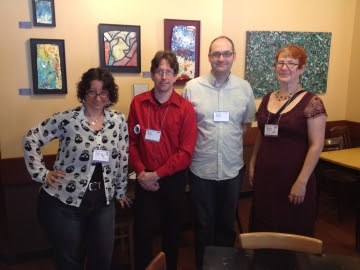written by Moritz Botts
Who wouldn’t have liked to have studied their university subject using their favorite science fiction or fantasy stories? I missed a crossover between my favorite genre fiction and the subject he was studying, so when I became a PhD student and lecturer at a German university, I decided to take matters into my own hands and asked my professor if I could teach a business course using Escape Pod as the main source. I might have understated the fact that Escape Pod is a science fiction podcast though†�
The first question of course is, whether science fiction or fantasy stories lend themselves to the subject that is taught. Accounting would be a difficult subject to teach with a Robert E. Heinlein story, and human anatomy courses should probably stick to the regular, human based textbooks. There are certainly fields which are much more open to genre fiction, like anthropology, which Julianna Beaudoin of Western University in London, Canada, teaches via science fiction and fantasy classics. Authors like Ursula K. LeGuin, a daughter of anthropologists, immediately come to mind in this field. Ram Mudambi of Temple University, PA, uses the fantasy novel The Empire of the Zon as a source for his undergrad international business classes. If a manager has to study foreign cultures and their ways of doing business, why not go for a totally foreign, a fantasy culture? I decided to not rely on my students’ motivation to read though, but rather thought that podcasts would be a solution that make it more likely that students could listen to the “required listening of the week” during their commute, while exercising, or while shopping. Of course, it doesn’t hurt that all podcasts offered by Escape Artists are available free of charge.
Before the course began, I asked myself a couple of questions: Were Escape Pod, Podcastle, or even Pseudopod, podcasts I have been following since 2010, suitable for a university course? Would the young generation of students be open to genre fiction? Could podcasts make it easier for students to follow the course? There was only one way to find out!
In the summer of 2014, the course “Business and Economics in Fiction Podcasts” was offered to undergraduate students of international business at a German public university. The university has a strong international focus, and more than 50% of the students who eventually signed up for this course were exchange students from the European Erasmus program, coming from countries such as Poland, Russia, Turkey, France, Italy, or Greece.
Students picked a podcast from a selection of science fiction and some fantasy podcasts, mostly from Escape Pod and Podcastle. I had preselected these podcasts to include some economics or business related topic, often following suggestions from Escape Artists’ forums. These included totally new takes on supply and demand with Nancy Kress’ “Nano comes to Clifford Falls” (EP 075), the meaning of value with Daniel Abraham’s “The Cambist and Lord Iron” (PC 051), or intercultural communication with David D. Levine’s “Tk’tk’tk” (EP 045). You can see the complete list of stories at the end of this article. In many cases, this meant near future stories with social criticism by authors such as Nancy Kress or Cory Doctorow. Even though students would usually be 21 years old or older, no Pseudopod stories were selected.
The course was offered as a “soft skills” course with credits but no grade, to make it easier to experiment a bit. A typical week would include two presentations by student groups and a section on different academic skills, such as presenting, citation, editing podcasts, or creating a wiki. Therefore, even if the idea of using the podcasts terribly backfired, the students would have still taken something useful with them.
The results of the course were somewhat mixed. On the one hand, all stories were suitable to be used as case studies in economics or business on an undergraduate level. One German student mentioned that he had been very skeptical about using science fiction stories at first, but when he listened to his story – Paolo Bacigalupi’s “The Tamarisk Hunter” (EP 384) , he immediately “got it”. A group of Turkish students presented Tobias Buckell’s “Anakoinosis” and expressed a deep concern for the ethical issues discussed in the story. For me, it was initially a bit weird to hear my students present genre fiction authors and talk about the awards they got, but why should a story concerning aliens and spaceships be any weirder than a business case?
The lack of a grade for the course led to a couple of rather lackluster presentations though, and not all students would listen to the podcasts regularly. For future iterations of this course, incentives for a stronger engagement of the students should be given. Also, as the stories seem to “work” in an academic setting, grades could certainly be given, which should raise the quality of the students’ presentations.
To evaluate the course, I handed out a questionnaire during the last class. This survey is not really representative, because of the small class size. Nevertheless, there are a couple of trends that can be seen. Most students hadn’t really heard of podcasts before the start of the course. They usually listened to the course’s story on their computer while not doing anything else. There was only one native speaker of English in the course, and most students found it easier to follow the stories in a written format alongside the audio file.
About half of the students actually like science fiction stories. While most students only listened to a couple of the podcasts, they usually listened to more than one, the most popular being “Tk’tk’tk”.
I am sure that I will offer this course again in an upcoming semester. New and engaging Escape Pod (and Podcastle and Pseudopod) stories will certainly enhance the next course, so keep them coming!
Short stories included in the Curriculum
Week 1: From Babel’s Fall’n Glory We Fled… (Michael Swanwick), Escape Pod
Week 2: Accounting for Dragons (Eric James Stone), Podcastle
Week 3: Nano Comes to Clifford Falls (Nancy Kress), Escape Pod
Week 3: The Tamarisk Hunter (Paolo Bacigalupi), Escape Pod
Week 4: Dragonomics (Lance Shonberg), Cast of Wonders
Week 4: The Cambist and Lord Iron (Daniel Abraham), Podcastle
Week 5: Anakoinosis (Tobias Buckell); Dunesteef
Week 5: Special Economics (Maureen F. McHugh), Clarkesworld
Week 6: Anda’s Game (Cores Doctorow), Podiobooks
Week 6: Patent Infringement (Nancy Kress), Escape Pod
Week 7: Just Do It (Heather Lindsley), Escape Pod
Week 7: Tk’tk’tk (David D. Levine), Escape Pod
 Moritz Botts is a research and teaching assistant at European University Viadrina in Frankfurt (Oder), Germany. His research focuses on intercultural differences in management, while his teaching includes international management and innovation management. He is also an intercultural trainer and interested in innovative teaching methods with diverse media. He has written a horror short story in German published in an anthology and various academic articles. You can contact Moritz at botts@europa-uni.de
Moritz Botts is a research and teaching assistant at European University Viadrina in Frankfurt (Oder), Germany. His research focuses on intercultural differences in management, while his teaching includes international management and innovation management. He is also an intercultural trainer and interested in innovative teaching methods with diverse media. He has written a horror short story in German published in an anthology and various academic articles. You can contact Moritz at botts@europa-uni.de






